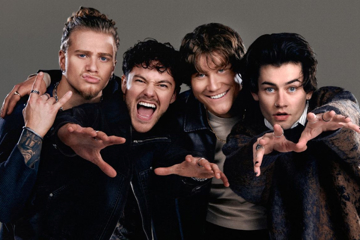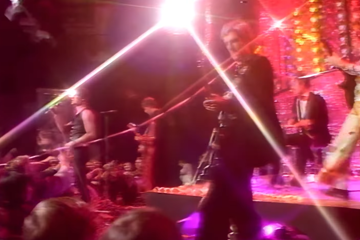Not Even Steven Spielberg Can Save 'Ready Player One' From Itself
"...the reason it’s the best moment of the movie is that it shamelessly rides the coattails of a better film."

Ready Player One is such a patchwork quilt of incessant pop-cultural references that its best sequence goes beyond homage, elaborately recreating the world of another film for its own use. Here, it’s The Shining, with the Overlook Hotel digitally-reborn with such precision that, at the screening yr old bean Film Carew attended, someone in the audience loudly gasped, for all to chuckle at. This virtual remaking of a past, precise cinematic landscape is a work of technical wonder, but the reason it’s the best moment of the movie is that it shamelessly rides the coattails of a better film.
This duly symbolises Ready Player One: a tale whose singular idea is to make endless references to other stories, and that only succeeds when it’s borrowing the emotional attachments you have to other things. It feels more like some cinematic equivalent of memes manifest than story begging to be told; only, there’s none of the chaotic, nonsensical absurdity of memedom, only a direly-predictable, wholly-conservative narrative in which, yet again, the geek shall inherit the earth.
It’s the written work of Ernest Cline, ‘Nerd Porn Auteur’, yet another emotionally-arrested grown man pining for the pop-cultural totems of his childhood. At this point in human history, white men waxing nostalgic for the '80s seem just as suspicious as those old Baby Boomers who’ve spent generations trying to sell you the hokum that society peaked in the summer of '69: familiar self-centred, blinkered nostalgia cut through with the creepy subtext of yearning for a “simpler” time in which white male privilege went unchecked and Luke Skywalker was alive.
Don't miss a beat with our FREE daily newsletter
What’s amazing is that this Ready Player One adaptation is being helmed by cinema’s ultimate power-nerd, Steven Spielberg, the director who, more than any other, is responsible for the ongoing reverence to, and resonance of, the VHS era. Spielberg’s presence makes for a few moments that make it seem like a stunt appointment: when there’s a reference, herein, to Jurassic Park, the nostalgia loop becomes a snake eating its tail. But his presence also means that Ready Player One is better than its source-text deserves: a work of wonder-sparkled popcorn-movie ambition from the guy who wrote the rulebook; the ever-sentimental director out to find the heart, and the idealism, in any story he tells. Spielberg’s presence also means we get a turn from his recent muse, Mark Rylance, an actor who, really, is far too good for this shit.
This shit is set in a dystopian 2045 — all overpopulation, corporate consolidation, and dark clouds — that Spielberg is so giddy to depict that he fails to make it seem particularly dystopian, this near-future just another realm for his ever-acrobatic camera to go cavorting through. If you’re wondering why a film set 30 years in the future is obsessed with the pop-culture of 30 years ago, why, friend, it’s right there in the story!
In this nightmarish realm of dream-fulfilment, Rylance is a mythical figure, the recently-deceased creator of a globe-conquering VR world called the Oasis. Akin to OZ in Mamoru Hosoda’s ambitious animé Summer Wars (take that for a nerd reference!), the Oasis is, an, um, oasis; a virtual enclave inuring its players from the horrors of reality surrounding them. Oasis a sprawling Second Life where the dress-code is '80s-movie cosplay; Rylance’s character his own emotionally-arrested devotee of distant pop-culture, his legions of fanboys creating in-game avatars filled with bibliographic reference to movies that he/Cline grew up loving.
This is the wise sage of myth as penned by a Porn Nerd Auteur: Willy Wonka by the way of Woz, a socially-inept loner who went from VHS binges to fashioning his own world of pure imagination. In his will, Rylance reveals he filled Oasis with (sigh) an array of 'Easter Eggs' steeped in esoteric geek trivia, and the first to catch ’em all will inherit the keys to his kingdom.
And, so, Tye Sheridan plays the all-too-likely unlikely-every-nerd hero, the lonesome orphan who’ll come from the middle of nowhere, solve the clues, get the girl, make some friends, and win the day. Uh, spoiler alert, I guess. Ben Mendelsohn is the chief antagonist, a corporate suit who is the worst kind of person: one who places no value in pop-cultural trash, only wants to monetise it, profiting from the people who do. Conspicuously dentured and coiffed like Superman’s evil twin, Mendo plays his part with sneering villainy. And the part is its own form of old-movie homage: this the kind of panto-worthy heel who existed, with ‘he’s evil’ simplicity, back in the dusty, distant days before there were multiplex-movies where you wondered if the villain was really the hero.
And, so, the gamer-geeks are out to win the day, to save Oasis from unscrupulous developers as if they’re saving the local clubhouse in some T&A teen-movie from — yes, again — the ’80s. With the corporate fuzz on Sheridan’s tale, there’s various mad dashes for clues and survival both online and off; Oasis, naturally, filled with challenges that play like classic video-games. Or are, y’know, actually just classic video-games: a climactic quest is literally just playing a game of Adventure on the Atari.
In the film, the line between virtual and reality grows ever blurry, and there’s some lip-service moralising about not confusing the two, and the importance of having real friends and actually kissing a girl once in your life. This story is set to thuddingly-obvious soundtrack cues from a certain decade, Ready Player One opening with Jump, closing with You Make My Dreams, feeling just as pandering as the story itself. Spielberg’s presence may mean there’s a sense of command to its action sequences, a genuine feeling of grandeur in this geek-out world building, but even he can’t save the story from itself, can bless the movie with any real reason to exist beyond making manifold references.







